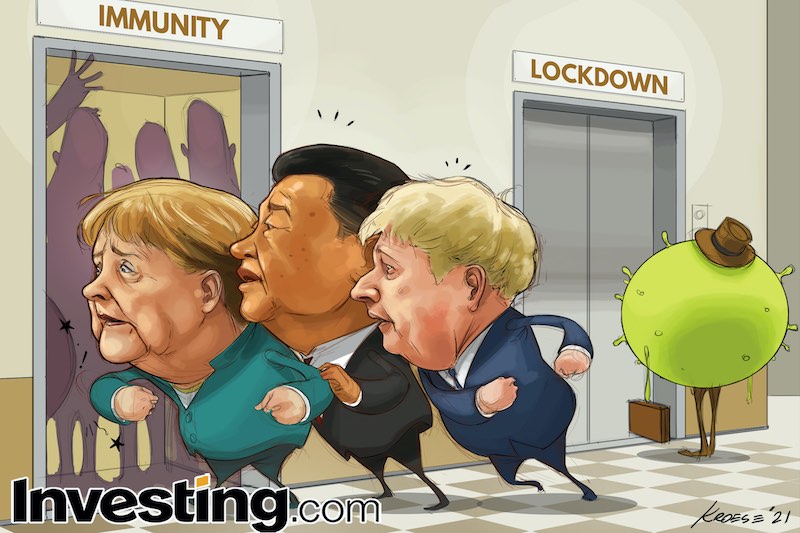Stock market today: S&P 500 rides Apple-led tech rally to close higher
By Geoffrey Smith
Investing.com --It’s a year since China confirmed its first deaths from the Covid-19. While the consensus is that the worst is now behind us, it’s becoming clear that even mass vaccinations won’t return the world to its pre-pandemic state immediately.
Yes, vaccinations are now taking place across the world, at increasing pace. Drugs from Pfizer (NYSE:PFE) and BioNTech, Moderna (NASDAQ:MRNA), AstraZeneca (NASDAQ:AZN), and from the research labs of China and Russia, have all been approved in various parts of the world. Results from the phase three test of Johnson & Johnson's (NYSE:JNJ) experimental drug may come as soon as this week, according to some reports.
But rollouts are proceeding painfully slowly in many places, particularly the European Union, which has given jabs to less than 2% of its population at the time of writing. That compares poorly to the U.K.’s 10% and is nowhere near Israel, with a best-in-class 40%. Even the U.K.’s rapid rollout is the product of a calculated gamble on stretching out a two-dose inoculation over a longer period of time than in the clinical trials. No-one knows whether that will reduce the effectiveness of the vaccine, although AstraZeneca, at least, says it shouldn’t.
Slow vaccination, at a time when new and more virulent strains of the virus are reaching the continent, is already causing governments to tighten their lockdown regimes and economists to revise their growth forecasts for this year downward. France is set to announce its third national lockdown this week, the government confirmed on Monday. Business confidence in Germany, the continent’s largest economy, fell to an eight-month low in January, according to the think-tank Ifo.
European Central Bank President Christine Lagarde hinted heavily at a double-dip recession for the Eurozone at her press conference, saying that: “Output is likely to have contracted in the fourth quarter of 2020 and the intensification of the pandemic poses some downside risks to the short-term economic outlook.”
In Japan, meanwhile, the government has been forced to deny reports suggesting that it has already given up hopes of staging the already-delayed Summer Olympic Games in Tokyo, which is still under a state of emergency due to the pandemic.
Even vaccination is no panacea, it seems. While it undoubtedly strengthens immune defenses, only time will tell how long it guarantees immunity, and how far it suppresses the ability of people to transmit the disease. And the vaccine race is still throwing up its share of disappointments: France’s Institut Pasteur and U.S. pharma company Merck both abandoned their main efforts at developing drugs on Monday after their experimental drugs failed to make the grade.
All of this is souring the optimism that was palpable in the final days of 2020, when the prospect of another year of government stimulus and loose monetary policy fostered hopes of a rapid and more or less synchronized global economic rebound. Many expect the International Monetary Fund to revise its growth forecast for world growth down when it updates its World Economic Outlook at 8 AM ET on Tuesday.
Of particular concern in recent days have been local outbreaks in regions of China, which have led to tens of millions of citizens being locked down for the first time in months, a setback for one of the more complete recoveries from the initial pandemic shock.
Official advisories, issued last week, against travelling home for the Lunar New Year were one of the main causes of the sell-off in crude oil prices (although the market has taken comfort from the discipline shown by key producers in the Persian Gulf and former Soviet Union).
To be sure, there are clear improvements to be seen. New infection rates and hospital admissions due to Covid-19 have dropped sharply in the U.S. in recent days, allowing California to lift a stay-at-home order. Restaurants from Baltimore to Chicago are reopening for indoor diners, albeit at only 25% capacity. Moderna said on Monday its vaccine is indeed effective against the two new strains – identified in the U.K. and South Africa - that worry scientists most (it’s still going to work on a new booster shot for the South African variant).
The new U.S. administration has moved quickly to dispel talk of a quick victory: quarantines and travel bans are set to be tightened for people entering the U.S. The distress of businesses and families everywhere will continue to generate pressure to reopen economies and, as Pantheon Economics’ chief economist Ian Shepherdson argues: “Every step towards re-opening before Covid is gone will delay the emergence of herd immunity, and therefore will cost lives which could have been saved.”
Of course, governments make such choices every day, in matters completely unrelated to Covid. Once the latest surge has crested, and the strain on hospital capacity lessens, the beginning of the end should be in sight. But the incessant pressure to reopen makes it all the more likely that progress out of the pandemic will be uneven, and fraught with risk.
